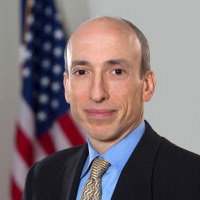Gary Gensler, chair of the US Securities and Exchange Commission, said innovations around crypto and decentralised finance will not persist outside the public policy framework.
Gensler spoke to Jay Clayton, former SEC chair, at the Digital Asset Compliance & Market Integrity Summit on 1 December.
Gensler said the crypto market does not currently have sufficient investor protection, which is the lens through which SEC staff look at everything, so the regulator is currently grappling with a $2.6 trillion worldwide asset class.
“I think new technologies do not persist for long if they stay outside the public policy framework,” he added. “If you are a proponent of projects, or this space, then you should know that without trust the public is not going to stay in sufficient numbers that you want in the long-term.”
Clayton agreed that investor protection is the touchstone but also said the technology has great promise in improving efficiencies.
Gensler said he is technology neutral but not public policy neutral. He agreed that payments businesses, central banks and the private sector have started to think about payment systems differently due to the competition from decentralised bearer forms of value transfer.
“Some people will call it currency but none of these projects have really taken on a full embodiment of a medium of exchange, unit of account and store of value,” added Gensler. “They have primarily been speculative stores of value.”
He has previously described the crypto sector as the “Wild West” and said many projects are turning to gatekeepers and lawyers to avoid regulation.
“That’s similar to the Wild West, how do we avoid the authorities ?” added Gensler. “I say to the gatekeepers, bring your projects into the SEC and talk to us, whether it’s a trading platform or a token, and find a path to registering and getting within the investor protection remit.”
However, Clayton argued that regulators will find it difficult to oversee a decentralised system. Gensler said economics will drive the market owards some centrality.
“I think that it’s rare to have a trading market that doesn’t have some centrality,” said Gensler. “Similar activities should get similar investor protections.”
Gensler explained that the asymmetry of information between the people raising the money and investors is one of the fundamental things driving the registration and reporting requirements.
Bitcoin ETFs
The SEC has approved bitcoin futures exchange-traded funds, which have started trading in the US, but has not yet approved spot bitcoin ETFs.
Gensler said he could not comment on issues before the SEC. However, he added that spot crypto platforms need to be registered with the SEC.
He added: “Get registered, come within the investor protection remit, the appropriate anti-manipulation rules and the custody issues.”
Grayscale Investments’ lawyers have sent a letter to the SEC saying the regulator was wrong to approve bitcoin futures ETFs, but not bitcoin spot futures.
The digital asset manager is committed to converting its investment products, including Grayscale Bitcoin Trust (GBTC), into ETFs. The digital currency asset manager hired David LaValle as global head of ETFs in August and selected BNY Mellon as an asset servicing provider. The intention is that BNY Mellon will also provide transfer agency and ETF services for the Grayscale Bitcoin Trust upon its conversion.
The Blockchain Association, a non-profit association, said in a letter to the SEC that approving a spot bitcoin ETP is the best way to protect and serve the interests of American investors.
The letter said: “The Commission’s approval of bitcoin futures ETPs naturally leads to the conclusion that its concerns regarding Section 6(b)(5) have been satisfied. Yet, the Commission once again invoked Section 6(b)(5) in rejecting a spot bitcoin ETP proposal less than two weeks ago.”
The Association said there is no valid justification for this double standard.




